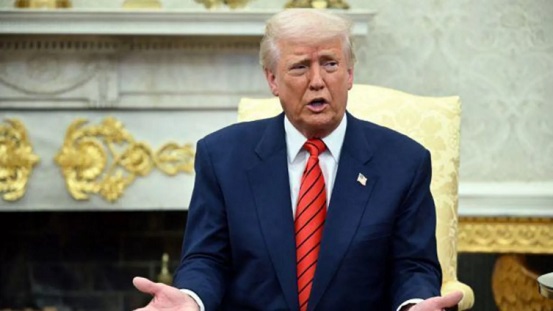The US Supreme Court has ordered the Trump administration to pause the deportation of a group of alleged Venezuelan gang members.
A civil liberties group had sued to stop the removal of the men, currently in detention in Texas, saying they had not been able to contest their cases in court.
Donald Trump has sent accused Venezuelan gang members to a notorious prison in El Salvador, invoking the 1798 Alien Enemies Act, which gives the president power to detain and deport natives or citizens of "enemy" nations without usual processes. The act was previously used only three times, all during war.
The White House called challenges to using the law for mass deportations "meritless litigation".
"We are confident in the lawfulness of the administration's actions and in ultimately prevailing against an onslaught of meritless litigation brought by radical activists who care more about the rights of terrorist aliens than those of the American people," White House Press Secretary Karoline Leavitt wrote in a post on X.
The Alien Enemies Act was last invoked in World War Two, when people of Japanese descent were imprisoned without trial and thousands sent to internment camps.
Since taking office in January, Trump's hard-line immigration policies have encountered a number of legal hurdles.
Trump had accused Venezuelan gang Tren de Aragua of "perpetrating, attempting, and threatening an invasion or predatory incursion" on US territory.
Out of 261 Venezuelans deported to El Salvador as of 8 April, 137 were removed under the Alien Enemies Act, a senior administration official told CBS News, the BBC's US news partner.
A lower court temporarily blocked these deportations on 15 March.
The Supreme Court initially ruled on 8 April that Trump could use the Alien Enemies Act to deport alleged gang members, but deportees must be given a chance to challenge their removal.
The lawsuit that resulted in Saturday's order said the Venezuelans detained in north Texas had been given notices about their imminent deportation in English, despite one detainee only speaking Spanish.
The challenge by the American Civil Liberties Union (ACLU) also said the men had not been told they had a right to contest the decision in court.
"Without this Court's intervention, dozens or hundreds of proposed class members may be removed to a possible life sentence in El Salvador with no real opportunity to contest their designation or removal," the lawsuit read.
Supreme Court Justices Clarence Thomas and Samuel Alito dissented on Saturday.
In his second inaugural address in January, Trump pledged to "eliminate the presence of all foreign gangs and criminal networks bringing devastating crime to US soil".
In the highest-profile case, the government admitted it mistakenly deported El Salvador national Kilmar Ábrego García, but contends he is a member of the MS-13 gang, which his lawyer and family denies. Mr Ábrego García has never been convicted of a crime.
The Supreme Court unanimously ruled that the government should facilitate bringing back Mr Ábrego García, but the Trump administration has said he will "never" live in the US again.
Senator Chris Van Hollen, a Democrat from Maryland, visited Mr Ábrego García in El Salvador and said he had been moved from the mega-jail Cecot (Terrorism Confinement Centre) to a new prison.
BBC





